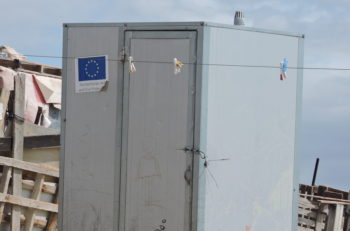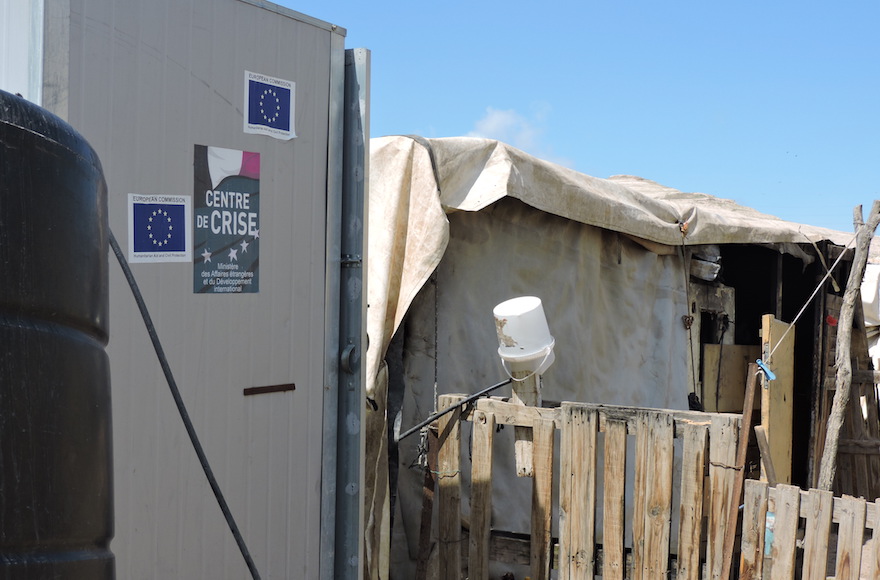MAALE ADUMIM, West Bank (JTA) — In a ramshackle village off a dirt road in the West Bank’s central hills, near an inhabited shack with a cloth roof and tin walls, stands an outhouse bearing a peeling sticker with the European Union flag. The text below the flag reads “Humanitarian Aid and Civil Protection.”
The outhouse is a much sturdier structure than the ones that surround it in this unrecognized community, with tight screws, clean walls fused at right angles, a hard roof, a lockable door and an air vent. It’s one of some 1,000 buildings across the Israeli-controlled areas of the West Bank with construction funded by the European Union.
From toilets to houses and schools, the buildings have set off a controversy over who should — and who may — provide for Palestinian welfare in the areas, which are known collectively as Area C. Buttressed by Regavim, a right-wing legal rights group, Israel contends that the EU buildings were built without Israeli permission and contravene international law. Israel has demolished dozens of the buildings in recent years.
“They’re building without authorization, against the accepted rules, and there’s a clear attempt to create political realities there,” Israeli Prime Minister Benjamin Netanyahu told members of Israel’s foreign press corps in January. “And when we take down this illegal construction we’re then, again, condemned, so it’s a Catch-22 here.”
The EU counters that Israel has abdicated its responsibility toward Palestinians under its control, so Europe is picking up the slack. During the past two years, the EU has provided some $15 million for Area C Palestinian development. In addition to buildings, the money funds water pipes and roads for Palestinian villages. The EU and the Palestinian localities have coordinated to create “master plans” for infrastructure, water projects and roads.
“The situation would also be greatly improved if the Israeli authorities were to approve the master plans for development submitted by local communities,” the EU office in Jerusalem — known as the Office of the European Union Representative — wrote in an email to JTA. “Failing that, Israel has the duty to agree to and facilitate international relief schemes and grant unimpeded access for humanitarian assistance.”
READ: In hardscrabble villages, Bedouin want recognition, not relocation
Anywhere from 150,000 to 300,000 Palestinians live in Area C, which includes all Israeli settlements and covers about 60 percent of the West Bank’s land area. Area C Palestinians live in some 180 villages, most of which are not recognized by Israel. Unrecognized villages often lack basic infrastructure and planning, and are under threat of demolition. Israel annually demolishes dozens to hundreds of Palestinian buildings in Area C, according to Bimkom, a group of Israeli planners and architects that advocates for Palestinian construction rights.

From toilets to houses and schools, EU-funded buildings have set off a controversy over who should — and who may — provide for Palestinian welfare in the West Bank areas known collectively as Area C. (Ben Sales)
Israel rejects nearly all the Palestinian requests for building permits in Area C. Of 240 Palestinian permit requests in 2014, just one was approved, according to Bimkom.
“There’s no direction or plan of action,” said Alon Cohen-Lipshitz, Bimkom’s Area C director. “This is an attempt to create control and deny Palestinian development. [They’re] not even considering those who are there.”
The Coordinator of Government Activities in the Territories, or COGAT, which manages Israel’s policies in the West Bank, has plans for four towns for Palestinians in Area C. Regavim says these towns are aimed at organizing haphazard Palestinian settlement across the territory. But opponents contend the towns could also take many Palestinians away from their agricultural way of life and place them in more crowded living arrangements.
COGAT’s policy of demolishing illegally built structures, however, doesn’t always translate to practice. In a March report, Israel’s state comptroller faulted COGAT for not enforcing laws against illegal building by both Palestinians and Israelis in Area C, and for executing demolition orders in an unorganized, unsupervised and non-transparent fashion. Both critics and defenders of COGAT point to the report as evidence that Area C’s legal practices need to improve.
READ: With Israeli-EU relations strained, Netanyahu looks toward Asia
Regavim has also accused the European Union of meddling in Israel’s politics by entrenching Palestinian presence around Israeli settlements. Israel’s relations with the EU already are strained following a European-Israeli spat last year over the EU’s guidelines encouraging the labeling of goods produced in Israeli settlements.
“They themselves are doing unilateral moves in Area C and not asking, not discussing with Israel,” said Ari Briggs, Regavim’s international director. “They have made a decision to work directly with the Palestinian Authority to give more control and power to the Palestinian Authority in Area C.”
The EU acknowledges having a political goal. Its 2014 Palestinian Humanitarian Implementation Plan says European funding “could pave the way for development and more authority of the P.A. over Area C.”
This goal, the EU says, is consistent with Israel’s commitments in the 1993 Israeli-Palestinian Oslo Accords. If much of Area C is to become part of a Palestinian state, the email said, there should be no problem with providing homes for Palestinians there.
“Area C is part of the occupied Palestinian territory and part of any viable future Palestinian state,” the email said. “The EU has repeatedly called for a fundamental change of Israeli policy to enable accelerated Palestinian construction, as well as social and economic development in Area C.”
JTA has documented Jewish history in real-time for over a century. Keep our journalism strong by joining us in supporting independent, award-winning reporting.






